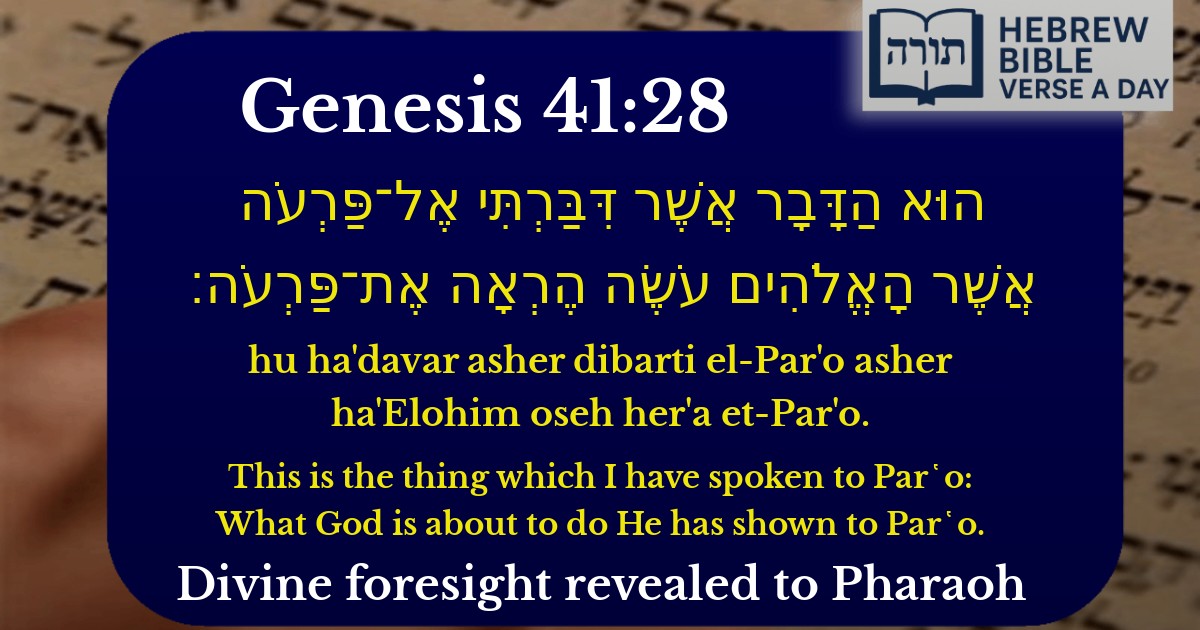Frequently Asked Questions
Q: What does Genesis 41:28 mean?
A: In Genesis 41:28, Yosef (Joseph) explains to Pharaoh that the dreams he had about seven fat cows and seven thin cows, as well as seven healthy ears of grain and seven withered ones, are a message from Hashem (God). Yosef is telling Pharaoh that Hashem is showing him what will happen in the future—seven years of plenty followed by seven years of famine. This verse emphasizes that Hashem controls events and reveals His plans to people, even to a non-Jewish king like Pharaoh.
Q: Why is this verse important in the Torah?
A: This verse is important because it demonstrates how Hashem communicates through dreams and how a righteous person like Yosef, who is connected to Hashem, can interpret them correctly. It also sets the stage for the fulfillment of Yosef’s own dreams from earlier in the Torah (Genesis 37), showing that Hashem’s plan unfolds in His time. Additionally, this moment leads to Yosef’s rise to power in Egypt, which ultimately saves the Jewish people during the famine.
Q: What can we learn from Genesis 41:28?
A: We learn that Hashem is in control of history and may reveal future events to people, even through dreams. Yosef’s ability to interpret Pharaoh’s dream correctly—because of his connection to Hashem—teaches us the importance of wisdom and divine insight. Additionally, this verse reminds us that Hashem’s messages can come to anyone, even those outside the Jewish people, when it serves His greater plan.
Q: How does this verse apply to us today?
A: While we may not receive prophetic dreams like Pharaoh did, this verse teaches us to recognize that Hashem guides events in the world. We should seek wisdom and understanding in our lives, just as Yosef did, and trust that Hashem has a plan even when things seem uncertain. It also reminds us to pay attention to signs and messages that may help us prepare for the future, whether spiritually or practically.
Q: Why did Hashem show Pharaoh the future in a dream?
A: According to Rashi and other commentators, Hashem gave Pharaoh these dreams to set in motion the events that would elevate Yosef to a position of power in Egypt. This was part of Hashem’s plan to ensure the survival of the Jewish people during the famine and to fulfill the prophecy given to Avraham (Abraham) about his descendants going down to Egypt (Genesis 15:13). By revealing the future to Pharaoh, Hashem ensured that Yosef’s wisdom would be recognized, leading to his appointment as vizier.


Context of the Verse
This verse (Bereshit 41:28) is part of Yosef's interpretation of Pharaoh's dreams, where he explains that the dreams foretell seven years of plenty followed by seven years of famine. Yosef emphasizes that the dreams are a divine revelation ("הֶרְאָה אֶת־פַּרְעֹה") from Hashem, demonstrating that the events are predetermined and inevitable.
Rashi's Explanation
Rashi (Bereshit 41:28) notes that Yosef's phrasing, "הוּא הַדָּבָר אֲשֶׁר דִּבַּרְתִּי," underscores the certainty of the prophecy. Yosef is affirming that the interpretation he provided is not speculative but a direct revelation from Hashem. Rashi further explains that the repetition of Pharaoh's name ("אֶל־פַּרְעֹה... אֶת־פַּרְעֹה") emphasizes that the message is specifically directed at Pharaoh, as the ruler responsible for preparing for the coming famine.
Rambam's Perspective
Rambam (Hilchos Yesodei HaTorah 7:7) discusses the nature of divine communication through dreams. He explains that true prophecy, as demonstrated here, is not a product of human imagination but a clear message from Hashem. Yosef's ability to interpret Pharaoh's dreams accurately—and his insistence that they are from Hashem—aligns with the criteria for authentic prophecy.
Midrashic Insights
Theological Implications
The verse reinforces the principle of hashgachah pratit (divine providence), teaching that Hashem orchestrates events for a greater purpose—in this case, to bring Yosef to power and ultimately save Bnei Yisrael. The Sforno (Bereshit 41:28) adds that the doubling of the dream (through Pharaoh's two visions) signifies the immutability of Hashem's decree, as established in the pasuk (Bereshit 41:32).